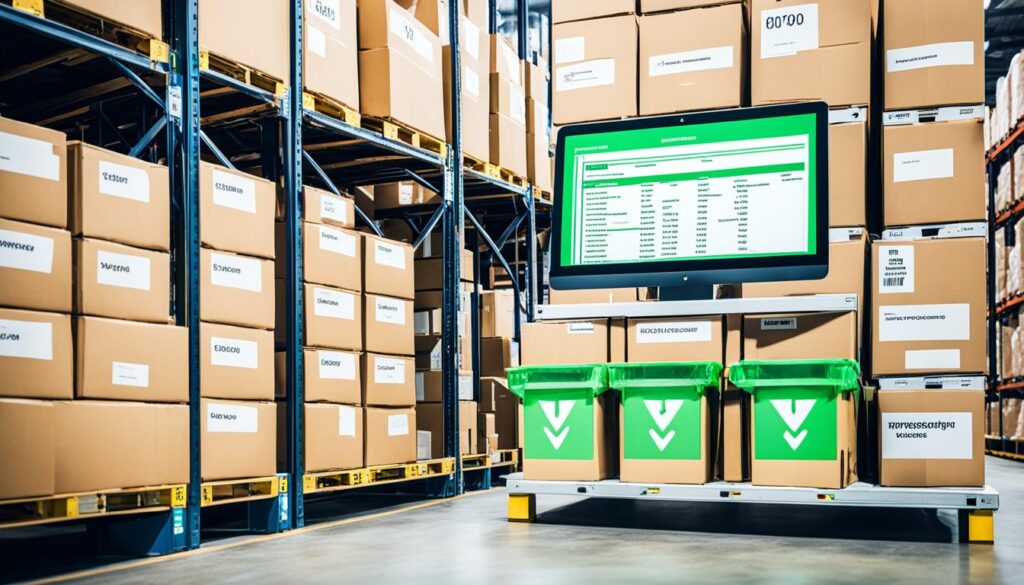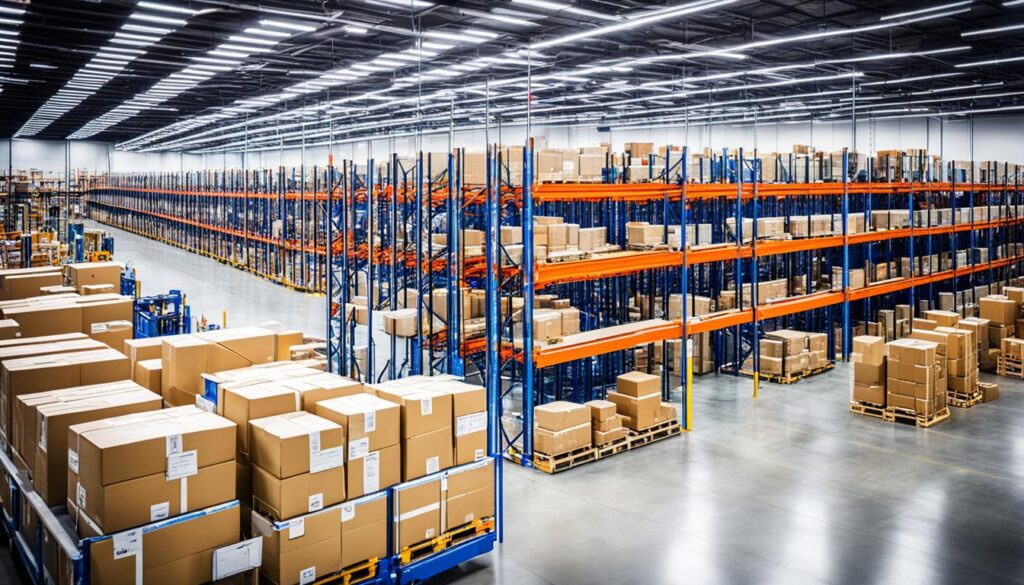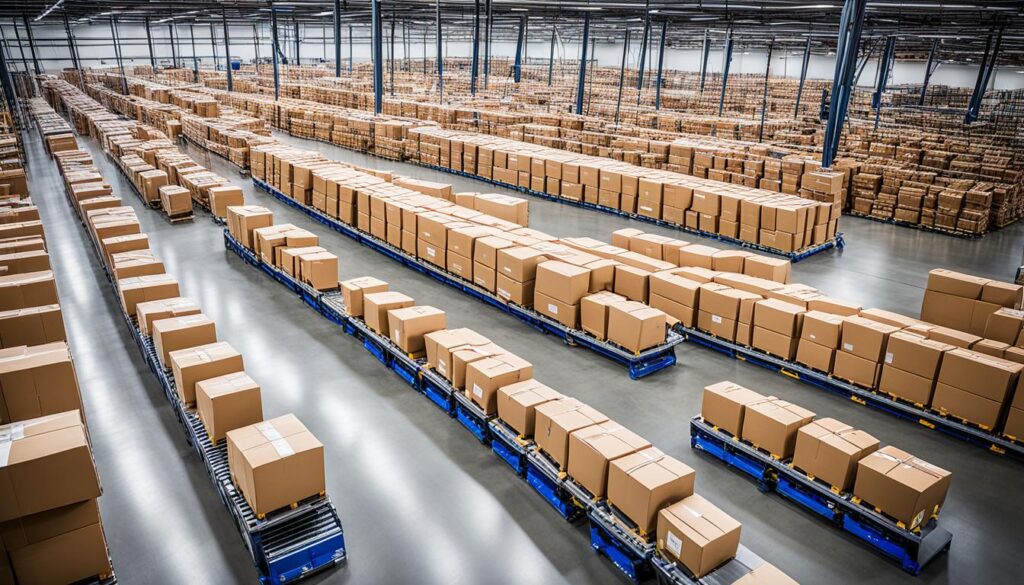Looking to streamline your ecommerce fulfillment processes and boost your inventory and shipping efficiency? Look no further than ecommerce 3PL solutions. These third-party logistics providers specialize in offering a wide range of services, including inventory management, order fulfillment, and shipping assistance. By partnering with a reliable 3PL provider, you can not only reduce costs but also improve customer satisfaction and focus on growing your business.
Key Takeaways:
- Ecommerce 3PL solutions can help ecommerce businesses streamline their fulfillment processes.
- Third-party logistics providers offer services such as inventory management and order fulfillment.
- Partnering with a reliable 3PL provider can help reduce costs and improve customer satisfaction.
- Ecommerce 3PL allows businesses to focus on growth while their logistics needs are handled by experts.
- Investing in ecommerce 3PL solutions can lead to increased efficiency and improved supply chain management.
What is a Warehouse Management System (WMS)?
A warehouse management system (WMS) is like the brain behind the scenes of an ecommerce logistics solution. It’s the software that helps third-party logistics warehouses manage their operations efficiently. A good WMS encompasses a range of functions that contribute to smooth and streamlined warehousing and distribution processes.
With a WMS, ecommerce 3PL providers can ensure that materials and goods move through the warehouse seamlessly. This includes accurate inventory management, tracking, picking, receiving, and even reverse fulfillment. By utilizing a WMS, these providers can improve organization, reduce costs, and increase revenue.

Key Features of a Warehouse Management System
Let’s take a closer look at some key features that make WMS an essential tool for ecommerce warehousing and distribution:
- Inventory Management: A WMS helps 3PL providers keep track of stock levels, ensuring optimal inventory control.
- Tracking: With real-time tracking capabilities, a WMS enables accurate monitoring of goods throughout the entire warehousing and distribution process.
- Picking: A WMS optimizes the picking process by providing efficient picking routes and instructions to warehouse staff, reducing time and increasing productivity.
- Receiving: When new stock arrives, a WMS automates the receiving process, making it easier to verify and update inventory levels.
- Reverse Fulfillment: In cases where returns or exchanges are necessary, a WMS streamlines the reverse fulfillment process for efficient handling and reintegration of the items.
By leveraging the power of a warehouse management system, ecommerce 3PL providers can ensure seamless operations, accurate inventory tracking, and efficient order fulfillment. This ultimately leads to improved customer satisfaction and a stronger competitive edge in the ecommerce landscape.
Benefits of Using 3PL Software
When it comes to ecommerce fulfillment, utilizing 3PL software can bring numerous benefits to the table. From reducing costs to improving customer service, 3PL software plays a vital role in managing the ecommerce supply chain, order fulfillment, and inventory management. Let’s take a closer look at some of the advantages:
- Reduced Costs: By leveraging 3PL software, both the 3PL provider and their clients can save money through streamlined processes, optimized operations, and better inventory management.
- Error Prevention: 3PL software minimizes the risk of fulfillment errors, ensuring accurate picking, packing, and shipping of orders. This leads to improved customer satisfaction and fewer returns.
- Customizable and Scalable: The flexibility of 3PL software allows businesses to customize and scale their fulfillment processes according to their specific needs. Whether it’s adjusting workflows or adding new features, the software can adapt to support growth.
- Increased Data and Insight: 3PL software provides valuable data and insights into the business. From inventory levels and order status to analytics and reporting, businesses can make informed decisions based on real-time information.
- Enhanced Customer Service: With 3PL software, businesses can offer a higher level of customer service. From order tracking and notifications to improved communication and transparency, customers can enjoy a seamless and satisfying shopping experience.
In the words of a satisfied ecommerce business owner:
“My 3PL software revolutionized my fulfillment process. It not only saved me money but also eliminated errors and gave me invaluable insights into my business. Plus, my customers love the improved service and visibility!”
By harnessing the power of 3PL software, ecommerce businesses can unlock a world of operational efficiency, cost savings, and improved customer satisfaction. It’s an essential tool for mastering ecommerce supply chain management, order fulfillment, and inventory management.
Ready for a visual representation? Take a look at the table below to see a side-by-side comparison of the benefits:
| Benefits | Reduced Costs | Error Prevention | Customizable and Scalable | Increased Data and Insight | Enhanced Customer Service |
|---|---|---|---|---|---|
| Descriptions | Streamlined processes and optimized operations lead to cost savings for both the 3PL provider and their clients. | Minimizes the risk of fulfillment errors, ensuring accurate picking, packing, and shipping of orders. | Flexibility to customize and scale fulfillment processes according to specific business needs. | Provides real-time data and insights into inventory levels, order status, and business analytics. | Improved customer service through order tracking, notifications, and enhanced communication. |
Key Takeaways
- 3PL software reduces costs, prevents errors, and offers customizable and scalable processes.
- It provides valuable data and insights into the business, enabling informed decision-making.
- Enhanced customer service and satisfaction are achieved through improved communication and transparency.

The Importance of Automated Ecommerce Fulfillment
Automated ecommerce fulfillment plays a pivotal role in the efficient functioning of the supply chain. By streamlining workflows and eliminating repetitive tasks through automation, ecommerce businesses can save time, reduce costs, and enhance overall efficiency. But it doesn’t stop there! Automating fulfillment processes also enables businesses to meet customer expectations for speedy shipping and delivery, avoiding potential order cancellations or dissatisfied customers.
To visualize the benefits of automated ecommerce fulfillment, consider the following:
- Time and Labor Savings: Automating fulfillment processes reduces the need for manual intervention, freeing up valuable time and labor resources. This allows businesses to focus on other critical aspects of their operations.
- Cost Reduction: By eliminating manual errors and optimizing workflows, automated fulfillment reduces costs associated with rework, returns, and inefficient resource allocation.
- Efficiency Improvement: Automation ensures that orders are processed swiftly and accurately, improving overall efficiency and reducing turnaround time.
- Enhanced Customer Experience: Timely delivery is a critical factor in customer satisfaction. Automated fulfillment enables businesses to meet delivery expectations, resulting in happier customers and increased loyalty.
By implementing automated processes, third-party logistics (3PL) providers can ensure ecommerce fulfillment is seamless and hassle-free. With the aid of warehouse management systems (WMS) and advanced software solutions, 3PL providers can optimize order processing, inventory management, and shipping. This allows them to expedite the entire fulfillment process and deliver a top-notch experience to their ecommerce partners.
“Automation is the key to unlocking the full potential of ecommerce fulfillment. Efficient processes, reduced costs, and satisfied customers are just a few of the many benefits that await businesses that embrace automation.”
To better understand the impact of ecommerce fulfillment automation, take a look at the following data:
| Automation Benefits | Statistics |
|---|---|
| Time Savings | Research suggests that automated ecommerce fulfillment processes can reduce order cycle times by up to 30%, enabling businesses to ship products faster and meet customer demands efficiently. |
| Cost Reduction | An analysis of ecommerce businesses adopting automation found an average cost reduction of 10-15% in their fulfillment operations, translating to significant savings over time. |
| Customer Satisfaction | Studies show that 67% of consumers consider fast shipping a crucial factor in their purchasing decisions. Automation allows businesses to meet these expectations, leading to higher customer satisfaction rates. |

Automation is revolutionizing ecommerce fulfillment, driving businesses towards greater efficiency, reduced costs, and improved customer satisfaction. Through the power of automation, ecommerce companies can gain a competitive edge in the dynamic world of online retail.
What is Order Fulfillment and How Does it Work?
Order fulfillment is the backbone of every successful e-commerce business. It involves a series of carefully coordinated steps, from storing inventory to shipping the final product to the customer’s doorstep. Whether done in-house or outsourced to a third-party logistics (3PL) provider, efficient order fulfillment is key to customer satisfaction and business growth.
When an order is placed, the fulfillment process begins with receiving inventory. Products are carefully organized and stored in dedicated locations, ensuring easy access and efficient retrieval. A well-organized inventory system is crucial for accurate order fulfillment and inventory management.
Once an order is received, it goes through several stages. First, items are picked from the storage location based on the order details. Then, these items are carefully packed to ensure safe delivery. The package is sealed, and a shipping label is added, ready for dispatch.
“Efficient order fulfillment is like a symphony, with each step harmoniously working together to deliver a seamless customer experience.”
At this point, the order is ready to be shipped. Depending on the chosen shipping method and carrier, the package is dispatched and the customer is informed of the tracking details. Timely and transparent communication regarding order status is crucial for customer satisfaction and confidence in the brand.
“Ship it like it’s hot! Fast and accurate order fulfillment leaves customers positively glowing.”
Not to be forgotten, returns processing is an integral part of order fulfillment. In the event of a return, efficient handling and timely resolution are essential to maintaining customer loyalty. Returns are received, inspected, and processed according to established procedures to ensure a seamless experience for the customer.
Planning Your Order Fulfillment Strategy
A well-thought-out order fulfillment strategy is crucial for ecommerce businesses looking to scale and exceed customer expectations. It requires careful consideration of various factors, such as the physical location of your operations, integrating technology for smooth order management and tracking, and offering free 2-day shipping to enhance customer satisfaction.
One essential element of an effective order fulfillment strategy is the strategic placement of fulfillment centers. By strategically locating your fulfillment centers, you can optimize shipping costs and reduce transit times. Consider establishing fulfillment centers in regions where your customer base is concentrated, enabling faster delivery and reducing shipping expenses.
Implementing technology integrations is another key component of a successful order fulfillment strategy. By integrating your ecommerce platform with inventory management and order tracking systems, you can seamlessly manage and monitor your orders from start to finish. These integrations provide real-time visibility into your inventory levels, ensuring accurate product availability and preventing overselling. Furthermore, they enhance order tracking capabilities, allowing you to provide updates and shipping notifications to your customers, improving their overall experience.
One effective strategy that can significantly impact customer behavior and conversion rates is offering free 2-day shipping. Fast and reliable shipping has become a top priority for consumers, and by providing this service, you can attract more customers and increase sales. However, it’s important to evaluate your shipping costs and determine if offering free 2-day shipping is feasible for your business. If it aligns with your budget and operational capabilities, it can be a powerful differentiating factor in the competitive ecommerce landscape.
Benefits of a Well-Planned Order Fulfillment Strategy:
- Optimized shipping costs and reduced transit times
- Real-time visibility into inventory levels
- Accurate product availability and prevention of overselling
- Improved order tracking and customer communication
- Enhanced customer experience
- Increased customer satisfaction and loyalty
- Higher conversion rates and sales growth
In summary, a well-planned order fulfillment strategy is crucial for ecommerce success. By strategically locating fulfillment centers, integrating technology systems, and offering free 2-day shipping where feasible, ecommerce businesses can optimize their operations, deliver outstanding customer experiences, and gain a competitive edge in the market.
Using 3PL for Ecommerce Order Fulfillment
As ecommerce businesses continue to grow, many are turning to third-party logistics (3PL) providers to handle their order fulfillment. By outsourcing tasks such as inventory management, packing, shipping, and storage to specialized providers, businesses can streamline their operations and focus on core competencies.
Partnering with a reliable 3PL provider offers several benefits to ecommerce businesses. First and foremost, it helps to reduce costs. By leveraging the infrastructure and expertise of a 3PL, businesses can avoid the need to invest in expensive warehousing and fulfillment resources. This cost-saving opportunity can be especially beneficial for small to medium-sized companies looking to scale their operations.
Furthermore, using 3PL services allows businesses to save time and improve their supply chain management. 3PL providers are equipped with advanced technologies and efficient processes to handle large volumes of orders, ensuring timely order fulfillment and accurate inventory management. This not only improves customer satisfaction but also reduces the risk of errors and delays.
When selecting a 3PL partner, consider the type of services they offer. Standard 3PL providers handle basic fulfillment tasks, while more comprehensive options can handle the entire fulfillment process from start to finish. Assess your business needs and align them with the capabilities and expertise of the chosen 3PL provider.
Overall, using a 3PL for ecommerce order fulfillment can be a strategic move for businesses aiming to improve efficiency, reduce costs, and enhance customer satisfaction. By partnering with the right 3PL provider, businesses can unlock the benefits of professional logistics solutions and focus on driving growth in their core areas.
Conclusion
When it comes to optimizing fulfillment processes in the ecommerce industry, ecommerce 3PL solutions are key. By leveraging warehouse management systems, automating order fulfillment, and partnering with reliable 3PL providers, online businesses can achieve higher efficiency, lower costs, and increased customer satisfaction. The strategic planning of order fulfillment strategies and the integration of technology further enhance the overall ecommerce experience.
Efficient and cost-effective fulfillment is crucial for staying ahead of the competition and building a successful online presence. By understanding the importance of streamlining operations and delivering exceptional service, ecommerce businesses can thrive in an ever-evolving market. With the support of ecommerce fulfillment services, such as ecommerce 3PL providers, online retailers can focus on growing their business while leaving the logistics to the experts.
From inventory management to order processing, ecommerce 3PL solutions offer seamless and scalable services that cater to the unique needs of online businesses. By investing in these services, businesses can optimize their supply chain, reduce operational costs, and achieve faster order fulfillment. Embracing the power of ecommerce 3PL is the key to unlocking growth, efficiency, and success in the competitive world of ecommerce.
FAQ
What are ecommerce 3PL solutions?
Ecommerce 3PL solutions are third-party logistics providers that offer services such as inventory management, order fulfillment, and shipping assistance to streamline the fulfillment processes for ecommerce businesses.
What is a Warehouse Management System (WMS)?
A Warehouse Management System (WMS) is a software that helps third-party logistics warehouses manage their operations efficiently. It includes functions such as inventory management, tracking, picking, receiving, and reverse fulfillment.
What are the benefits of using 3PL software for ecommerce fulfillment?
Using 3PL software for ecommerce fulfillment offers benefits such as cost reduction, lower risk of errors, customizable and scalable processes, increased data and insight, and improved customer service. It enables automation of various fulfillment tasks, increasing efficiency and providing valuable data for informed decision-making.
Why is automated ecommerce fulfillment important?
Automated ecommerce fulfillment streamlines workflows and removes repetitive tasks, saving time and reducing costs. It improves efficiency, enables faster order fulfillment, and helps meet customer expectations for faster shipping and delivery.
What is order fulfillment and how does it work?
Order fulfillment involves storing inventory, picking and packing products, and shipping online orders to customers. It can be done in-house or outsourced to a third-party logistics (3PL) provider. The process includes receiving inventory, picking items, packing, adding shipping labels, and shipping the order to the customer.
How can I plan my order fulfillment strategy?
To plan your order fulfillment strategy, consider the physical location of your operations, integrate technology for seamless order management and tracking, and offer free 2-day shipping to enhance customer satisfaction. Optimizing shipping costs and transit times through fulfillment center placement and technology integrations is crucial. Free 2-day shipping can attract customers and improve conversion rates.
What are the benefits of using 3PL for ecommerce order fulfillment?
Using third-party logistics (3PL) for ecommerce order fulfillment helps reduce costs, save time, and improve supply chain management. Different types of 3PL providers offer various levels of fulfillment services, ranging from handling basic tasks to comprehensive management of the entire fulfillment process.
What are the key benefits of ecommerce 3PL solutions?
Ecommerce 3PL solutions offer benefits such as increased efficiency, reduced costs, and improved customer satisfaction. By utilizing warehouse management systems, automating order fulfillment, and partnering with reliable 3PL providers, ecommerce businesses can streamline their fulfillment processes and focus on growth.
Can ecommerce 3PL solutions help with inventory management?
Yes, ecommerce 3PL solutions offer inventory management services as part of their offerings. They ensure accurate tracking and organization of inventory, reducing inefficiencies and improving order fulfillment.
How can ecommerce 3PL services improve supply chain management?
Ecommerce 3PL services can improve supply chain management by providing expertise, efficient processes, and access to technology solutions. They help optimize inventory management, order fulfillment, and shipping, resulting in a more streamlined and cost-effective supply chain.








Leave a Comment